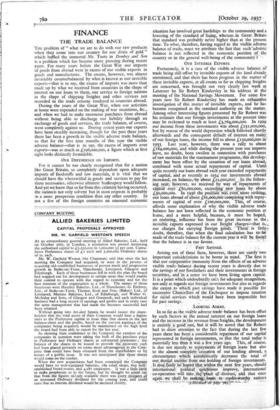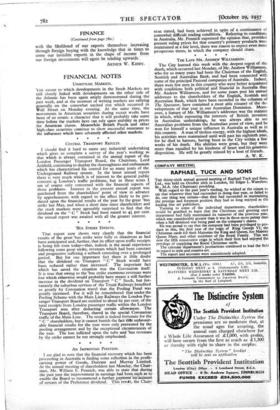FINANCE
THE TRADE, BALANCE
THE problem of " what we are to do with our raw products when they come into our country for our drain of gold " which baffled the immortal Mr. Toots in Dombey and Son is a problem which has become more pressing during recent years. For many years before the Great War our imports of goods from abroad were in excess of our visible exports in goods and manufactures. The excess, however, was almost invariably counterbalanced by what is known as our invisible exports—that is to say, the excess of imports was more than made up by what we received from countries in the shape of interest on our loans to them, our service to foreign nations in the shape of shipping freights and other services not recorded in the trade returns rendered to countries abroad. During the years of the Great War, when our activities at home were expended on the making of war munitions, &c., and when we had to make enormous purchases from abroad without being able to discharge our liability through an exchange of goods and services, the trade balance, of course, went completely against us. During recent years our exports have been steadily increasing, though for the past three years there has been a growth in the visible adverse trade balance, so that for the first nine months of this year the visible adverse balance—that is to say, the excess of imports over exports—was as much as £296,000,000, a figure which at first sight looks distinctly formidable.
OUR DEPENDENCE ON IMPORTS.
For it cannot be too clearly recognised that for a nation like Great Britain, so completely dependent upon adequate imports of foodstuffs and raw materials, it is vital that we should have the wherewithal in goods and services to pay for these necessaries, otherwise ultimate bankruptcy would follow. And yet we know that so far from this calamity having occurred, the natiOnis not only solvent but in most respects is probably in a more prosperous condition than any other country. In not a few of the foreign countries an unsound economic situation has involved great hardships to the community and a lowering of the standard of thiing, whereas. in Great . Britain that standard was probably never higher than at the present time. To what, therefore, having regard to the visible adverse balance of trade, must we attribute the fact that such'adverge balance is not reflected in the economic position • of the country or in the general well-being of the communiti? - OUR INVISIBLE EXPORTS.
Fortunately, it is a case of the visible adverse balance of trade being. still offset by invisible exports of the kind already. mentioned, and that there has been progress in the matter of these invisible exports, at all events so far as shipping freights are concerned, was brought out very clearly last week at Leicester by Sir Robert Kindersley in his address at the meeting of the National Savings Movement. For some few years now Sir Robert Kindersley has made an evflatistive investigation of this matter of invisible exports, and he has become recognised as the standard authority on the matter. Among other interesting figures presented by Sir Robert was his estimate that our foreign investments at the present tune; may be reckoned to reach at least £3,764,000,000. In 1929; our income from these investments was about £23r,000,000,- Nit by reason of the world depression which followed shortly afterwards and the consequent default of interest on many', of our foreign loans, the income fell to about Ltsopoo,000 in 1933. Last year, however, there was a rally to about Et84,000,00lo, and while during the present year our imports have, no doubt, been swollen in connexion with purchases, of raw materials for the rearmament programme, this develop-,' ment has been offset by the cessation of our loans abroado combined with some actual repaymenti of capital. Until. quite recently our loans abroad each year exceeded repayments: of capital, and as recently as 1934 our investments abroad increased, On balan0e,--hy about.4ar,000,000; the follow- ing.year; however,. we received- by way of repayments of caP4ar OyOk.':480,oipopo00, exceeding . new by about £30;000,000. In 1936 the po40421411.'eti.en:nrore striking, our loans abroad of about L6t,o6o,ciiii:CoMparing-ivith repay tnents of capital of over ktoo,000,000. This, of course, affords some explanation of why the visible adverse trade balance has not been reflected in the economic position at home, and a more helpful, .because,.. it must be hopod, an endtifing,, influence has been the great increase' the7 invisible eXpOrts expressed in our -freight- chargeiLthat our charges for carrying foreign goods. -There': littl doubt,: therefore, that when -the final caladation-has to made of the trade balance for the current year it will be fifnitla that the balance is in our faVOur.
PAST SAVINGS:
Arisinkttut of these facts, however, there are surely' two important tonsidetations to be borne in mind. The first is that Our coinpaiadve immunity from the effects of an adverse visible -trade, balance during recent years is directly due to the savings of our forefathers and their investments in foreign 'pease we have been living upon capital. It is a PointWhich undoubtedly cal±i for adequate recognition, not-only. as regards.our foreign investments but also as regards the extent-,to' which past--savings have made it possible for successive Chancellors of the Bxchequer to impose taxation for iicial,seiviCes' which` would have been impossible but for past savings... .
.LODY.INO- AHMD.
In so far as. the_visible adverse -tratle-balance has been offset by sitCh Acton '4S- the annual interest on our foreign loans and the increase in revenue frimi.freighis, the development is entirely- good ;one", Ent' be noted that Sir Robert had to- driiv attention to the fact that during the last few years there has been a considerable repayment of our capital represented iii foreign investments, so that the total today is materially-less than it was a TeW years .ago. This, of course, is due not Merely, to repayments. of foreign loans .but also to the almoii!complete 'cessation of our lending-. abroad, a circumitnfibe'_:Wlikh antoinitically decreases the total of our anau, _ in ine from our holding of foreign investments. it:1414"filr.11.h. 4401:tat: Y;l414r. the next fey/ years,-should international-_ political c,oiiditionS improve, international co-operation= will tilte,the'vface Q1 distrust; and that once '021' Mair,ing- loans r to credit4orthy natiors --(C1W:Ftreed-oh prigera'!5*-
• •
FINANCE
(Continued from page 780.) with the likelihood of our exports themselves increasing through foreign buying with the knowledge that in times to come our invisible exports in the shape of income from our foreign investments will again be tending upwards.
ARTHUR W. KIDDY.



























































 Previous page
Previous page